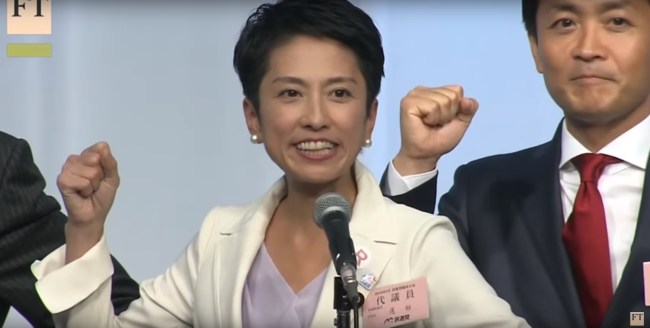Welcome to Feminism Around the World, a weekly feature here at TMS where we focus on women’s lives and feminist concerns… around the world. TMS is a US-based website, but we think it’s important to connect with women all over the globe to applaud successes, report injustices, and amplify the conversation around solutions to gender-based inequality. We’ve written about women in other countries before, but we’d now like to make it a more consistent priority. Because “Until we are all free, we are none of us free.” – Teresa
Japan: Opposition Party Elects Renho First Female and First Mixed-Race Leader in Landslide

Renho Murata, who goes by the mononym Renho, made history last week when she was elected leader of Japan’s Democratic Party, the opposition party and second-largest in Japan only to the ruling Liberal Democratic Party. According to The Japan Times:
Renho emerged victorious with total of 503 points out of 849. Her rivals, veteran lawmaker Seiji Maehara and rookie contender Yuichiro Tamaki, garnered 230 and 116 points, respectively.
Of the total 849 points up for grabs, including votes by Diet members, 206 points were allocated to some 1,600 local and prefectural assembly members. Ballots cast by rank-and-file party members accounted for slightly more than 50 percent of the total points.
This is huge, because she is not only the first woman ever elected to lead Japan’s Democratic Party but, being half Japanese and half Taiwanese, she is the first mixed-race person elected to the position. And as we know from a couple of Feminism Around the World columns ago, having someone represent Japan who isn’t 100% ethnically Japanese is a point of controversy.
Still Renho, who had just served as the Deputy President of the party, is popular. The 48-year-old mother of two has huge name recognition: she was formerly a swimsuit model, then a TV news anchor. It was in this position that she began to build a reputation as a critic of government budgetary waste. In 2004, she was elected to the House of Councillors, the “upper house” of Japanese government, and served a six-year term. After that, she became the Administrative Reform Minister in 2010, and then was elected Deputy President of the Democratic Party.
After last week’s election, however, she’s now in charge of the party that is the largest voice in opposition to Prime Minister Shinzo Abe’s administration, and she has big plans, particularly where women are concerned.
As reported by The Japan Times, Renho said after having been elected, “We are up against the juggernaut of the ruling coalition and the highly popular administration” of Prime Minister Shinzo Abe. But we won’t just criticize the ruling power. Rather, we’ll propose actual counter-policies so we can become the party of people’s choice.”
At an earlier debate during her campaign, Renho said, “Women need to fight lots of invisible pressure in order to get a leg up in this society. I may look strong, but I’m actually weak and shy. But by breaking the glass ceiling myself, I hope women, and the men who support them, will be encouraged to work harder and make Japan a less suffocating place to be.”
It’s an interesting time for women in Japanese politics. While Japan has one of the lowest percentages of women in parliament in the world at 9.5% (which, according to Quartz, places them “at almost the same level as Botswana, The Gambia, Burkina Faso, and Cote d’Ivoire.”), women have been making huge strides recently. For example, the newly-appointed Defense Minister is a woman named Tomomi Inada, who is considered by many to be Abe’s successor, while Tokyo’s new governor is a woman named Yuriko Koike.
Not that Renho doesn’t have roadblocks ahead of her, mostly due to her currently holding dual Japanese/Taiwanese citizenship, which is seen as a scandal, and she’s been criticized for not handling herself well around the issue in the press. Initially, she claimed that she actually doesn’t have Taiwanese citizenship anymore, since Chinese law stipulates that Chinese citizens abroad automatically forfeit their citizenship upon acquiring foreign nationality elsewhere. However, Japan doesn’t recognize Chinese law, or apply it to Japanese citizens, so to Japan, she’s totally still a Taiwanese citizen, and would have to formally renounce it in order to not have dual citizenship, which she says she’s in the process of doing. It’s a whole thing.
Despite your standard political “scandals,” it seems that Renho, along with several other women in Japanese politics are making moves to create greater gender equality in their nation’s government. We’ll be keeping an eye on them!
NEWS FROM ELSEWHERE
INTERNATIONAL: “Amal Clooney takes ISIS to trial over human trafficking, genocide” (Today, 9/19/16)
INDIA: “HC extends abortion right to live-in relationships” (The Times of India, 9/22/16)
If you have a story you think should be included in a future Feminism Around the World column, please email it to [email protected] with “Feminism Around the World” in the subject line. Please note that this column is exclusively reserved for stories related to women in countries outside the U.S. Please send current stories that have been posted/printed within a week of the previous FATW column. Thank you, tipsters!
(images via Shutterstock and a screencap from Financial Times)
Want more stories like this? Become a subscriber and support the site!
—The Mary Sue has a strict comment policy that forbids, but is not limited to, personal insults toward anyone, hate speech, and trolling.—
Follow The Mary Sue on Twitter, Facebook, Tumblr, Pinterest, & Google+.









Published: Sep 21, 2016 05:25 pm